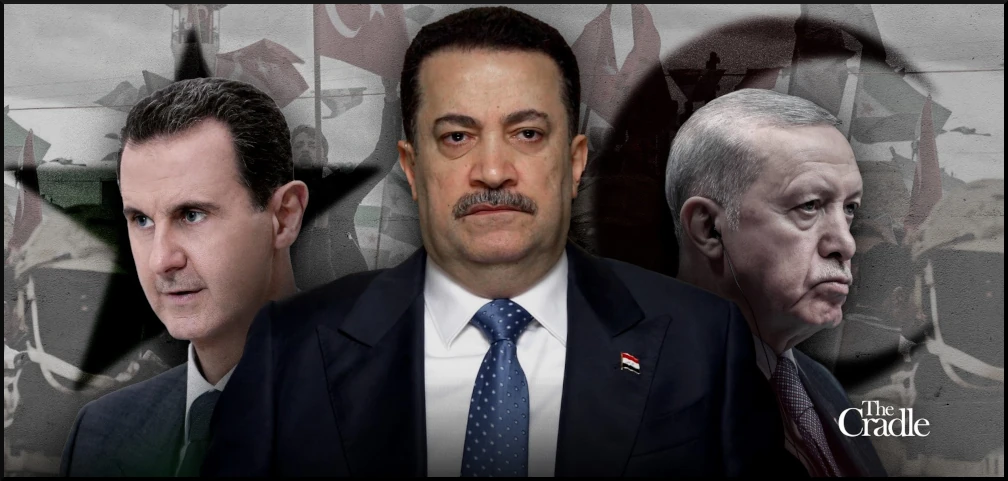by Khalil Harb, published on The Cradle, June 17, 2024
Recent developments indicate a potential thaw in the frosty relations between Damascus and Ankara, but a breakthrough remains uncertain.
Despite the bleak outlook, Baghdad hopes to replicate its past success in mediating between adversaries. In April 2021, Iraq facilitated a secret meeting between regional rivals Saudi Arabia and Iran, initiated by Saudi Crown Prince Mohammed bin Salman (MbS).
That initial dialogue, led by Iraqi National Security Advisor Qasim al-Araji, eventually paved the way for the normalization of relations between Riyadh and Tehran, announced in Beijing in March 2023. The Cradle also revealed last year that Iraq had been hosting talks between representatives from Iran and Egypt, spearheaded by Prime Minister Muhammad Shia al-Sudani.
Now, Sudani has expressed hopes of advancing reconciliation between Syria and Turkiye. In an interview with Turkish newspaper Haberturk, he referenced ongoing discussions with Turkish President Recep Tayyip Erdogan and Syrian President Bashar al-Assad.
Despite Sudani’s optimism, skepticism persists. Five days later, he spoke with Assad, but official statements from Baghdad and Damascus did not mention a Syrian–Turkish thaw. However, an Iraqi government source cited by Shafaq News Agency suggested efforts are underway to restore relations, with an upcoming Iraqi-mediated meeting expected between Ankara and Damascus representatives.
Territorial disputes and political conditions
Major General Abbas Ibrahim, former director general of Lebanon’s General Security, remains doubtful, citing the Turkish occupation of Syrian territory as a major obstacle. He tells The Cradle that “this reconciliation will not take place as long as there is a Turkish occupation of Syria’s territory,” noting that Turkiye sets political conditions for withdrawal that are impossible for Syria to accept because it infringes on its sovereignty.”
Lebanese writer Mohammed Noureddine, an expert on Turkish affairs, echoes this sentiment, attributing Erdogan’s stance to an “Ottoman ideology” aiming to reclaim northern Syria.
This can be traced back to the borders of the “Milli Charter” of 1920, which included northern Syria within the borders approved and drawn by the Ottoman parliament at the time.
“Erdogan’s presence in power is a decisive factor in not reaching reconciliation with Syria,” says Noureddine.
The bleak outlook of experts is not unjustified. On 1 June, Turkish Defense Minister Yasar Guler floated what appeared to be a response to Sudani’s remarks to the Turkish newspaper, redefining the conditions for such a rapprochement, stating:
We are ready to support the adoption of an inclusive constitution, the holding of free elections, comprehensive normalization, and the establishment of a secure environment. After these are accomplished and our border security is fully ensured, we may consider withdrawal if necessary.
Noureddine argues that Turkiye’s stringent terms hinder progress because “Turkiye does not want reconciliation with Syria except on its terms, this truce is faltering.”
The “rock of Sisyphus” that Iraq faces in reconciling Damascus and Ankara may not be insurmountable. With Erdogan having secured his election win, he may no longer need to leverage the Syrian conflict for political gain.
Additionally, the current political climate in the US could impact Turkish calculations. If Donald Trump is re-elected president in November, Turkiye might reassess its approach to the Kurdish-controlled areas in northeastern Syria.
The instability in northern Syria is a significant concern for Ankara. The ongoing regional conflict and attacks on US occupation forces in eastern Syria by Iraqi resistance factions have led to a temporary settlement between the Biden administration and Baghdad.
The US factor: Regional instability and military occupation
This settlement involves halting US operations against resistance factions in exchange for stopping attacks on US bases. These developments suggest that the US military presence in eastern Syria is increasingly vulnerable, though a withdrawal is unlikely during the current election season.
But all that may change if Republican Trump succeeds in removing President Joe Biden from the White House.
Erdogan still recalls how Trump decided overnight to talk about the absurdity of the US military presence in eastern Syria and the need to withdraw US soldiers from there. This exit will force the Turks to recalculate their dealings with the areas of the Kurdish “Autonomous Administration” in northeastern Syria and may open a necessary door to contact Damascus.
The “vacuum” in northern Syria is a terrifying scenario for Ankara. In light of the war raging in the region for more than eight months, US analysts have increasingly estimated that the US occupation east of the Syrian Euphrates may end if there is an escalation of attacks by Iraqi and Syrian resistance factions.
The Biden administration has considered a temporary settlement with the Sudani government: in this scenario, the US would halt its assassinations and raids on Iraqi resistance factions in exchange for a halt on targeting US military bases – while negotiations continue between Baghdad and Washington on the fate of US military force presence in Iraq.
These developments have reinforced assessments that US troops stationed in eastern Syria have become more exposed and vulnerable. But any idea of military withdrawal now, in an election season, will garner criticism against Biden. It is more likely that an exit of US forces may take place in the year after the election, whoever assumes the Oval Office.
Damascus’ demands – a commitment to withdrawal
Syrian Foreign Minister Faisal Mekdad has recently reiterated that any dialogue with Turkiye must involve “accurate pledges that reflect Turkey’s commitment to withdraw from the territories it occupies and stop its support for terrorist organizations.”
Speaking to The Cradle, Turkish political analyst Albatakin Dursunoglu says that Erdogan’s Syrian adventure “brought not only economic and social burdens to Ankara but also geopolitical burdens,” recalling how Erdogan pressured the US to prevent Damascus from carrying out a military operation to liberate Idlib from the grip of armed factions in 2018:
Since then, an equation has been formed between the east of the Euphrates and Idlib that guarantees the existence of each other, and while the state of the People’s Protection Units [Kurdish] in the east of the Euphrates, with US support, the emirate of Hayat Tahrir al-Sham [HTS] in Idlib is directly protected by Ankara.
According to Dursunoglu, “This means that thousands of militants, whom Ankara considers terrorists, will come to Turkiye, so Ankara is trying to resolve the two issues of the two quasi-states, which pose a threat to its national security and constitute an important geopolitical issue for it.”
The US State Department’s opposition to municipal elections in Kurdish-controlled areas east of the Euphrates and Erdogan’s declaration against a “terrorist” statelet in northern Syria further complicate the situation. Erdogan’s recent “historic” visit to Baghdad, aimed at addressing the Kurdish separatist threat, reflects his strategy to strengthen Ankara’s security belt in Iraqi and Syrian territory.
It has been almost two months since Erdogan’s first visit to Baghdad in 12 years. His central goal, an Iraqi source informs The Cradle, is rapprochement with Iraq on the “terrorism file” – a reference to Turkish foes, the Kurdistan Workers’ Party (PKK) and the Syrian Democratic Forces (SDF).
In fact, the Turkish president had refrained from finalizing his Iraq visit until Baghdad announced a PKK ban. This move paved the way for security understandings, the contents of which Erdogan revealed when he said that his country intends to strengthen Turkey’s extended “security belt” in Iraqi and Syrian territory to block the outlets exploited by the party.
Despite Erdogan’s previous failures to undermine the PKK in Iraq, he is now seeking an alliance with Baghdad, offering inducements such as increased water flows and the “Development Road” project. Elections in Kurdish-controlled areas could have accelerated a Turkish invasion, a scenario likely unwelcome in Biden’s electoral calculations.
Potential for reconciliation
Turkish researcher Muhammad Alloush tells The Cradle that cooperation with Damascus could be crucial for Ankara to combat the Kurdish separatist project. However, Javad Gok, a consultant at the Center for Strategic Studies in Turkiye, remains pessimistic, citing the Turkish government’s reluctance to take concrete steps towards normalization with Damascus:
The Turkish opposition is pressing heavily regarding the issue of the return of Syrian refugees in Turkiye and the need for cooperation between Ankara and Damascus. Still, the Turkish government does not respond to these pressures, as if it does not want to deport refugees nor display Turkish political movement toward Damascus. As long as the Turkish government is silent on this issue, there will be no concrete steps by Ankara on normalization with Damascus.
Yet, in the face of numerous challenges and widespread skepticism, there are hints that reconciliation between Syria and Turkiye may still be possible. Regional analyst Muhannad al-Haj Ali tells The Cradle of “an Iraqi initiative based on the previous Russian initiative” and that “there are leaks saying that Turkiye agreed to withdraw from Syrian territory” – a key demand and condition set by the Syrian government for normalization with Ankara.
As Erdogan seeks to mitigate losses after his recent election victory, Iraq’s mediating role could be pivotal, presenting new opportunities for diplomatic breakthroughs.
 Syria Support Movement solidarity with the Syrian people
Syria Support Movement solidarity with the Syrian people





